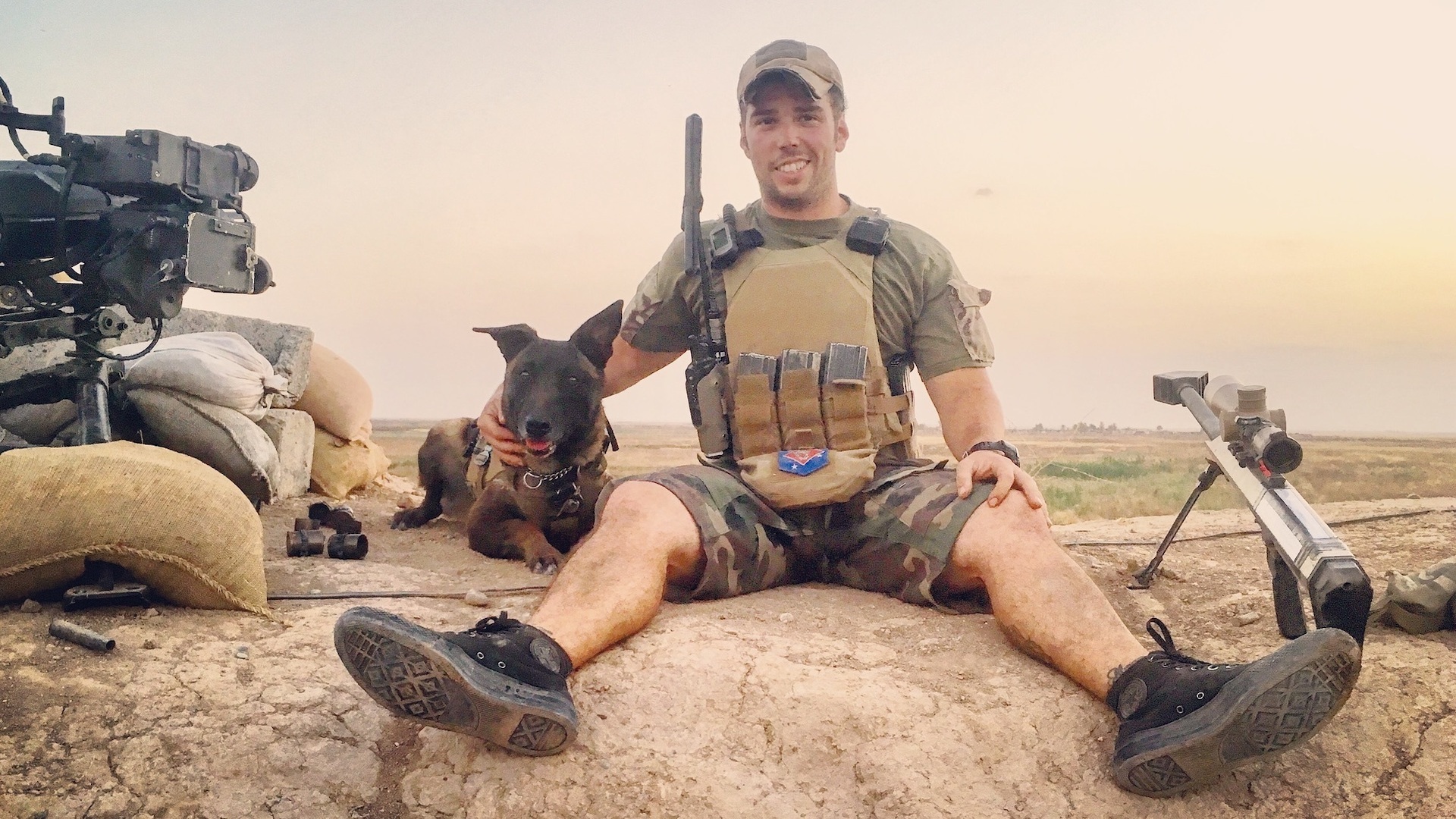

Multi-purpose Canine Shimanski, a 12-year-old Belgian Malinois who is going slightly gray in his muzzle, has more than earned the title of combat veteran.
Between 2013 and 2018, Shimanski deployed to Afghanistan, Iraq, Jordan, and Somalia with U.S. Marine Corps Forces Special Operations Command, during which he searched for explosives while under fire, said retired Marine Staff Sgt. Brandon Marquez, Shimanski’s former handler.
“This does really take a very special animal to only do it but to be capable of doing it, the things that we put them through,” said Marquez, who later adopted Shimanski “He’s not just a dog that’s getting pet by the team and everybody’s happy to have him around. He’s really out there holding his weight.”
For his service with the Marines, Congress is awarding Shimanski The Animals in War & Peace Medal of Bravery, an award created in 2019 to honor service animals who have gone above and beyond the call of duty.
Subscribe to Task & Purpose Today. Get the latest military news, entertainment, and gear in your inbox daily.
Shimanski will join the ranks of other heroic service animals who have received the award including Cairo, the military working dog who took part in the 2011 Navy SEAL raid that killed former al-Qaida leader Osama bin Laden.

Marquez said he first got to know Shimanski in February 2013. By that time, Shimanski, who was born two years earlier in the Netherlands, had already received his name, and since it was unique Marquez decided to keep it.
The two Marines spent about six months training together before deploying to Afghanistan, Marquez said.
“Ninety-nine percent of my job was understanding what all of his body language was,” Marquex recalled. “If his tail started to spin in a clockwise circle, he was starting to smell explosives.”
In the form he submitted to nominate Shimanski for the Medal of Bravery, Marquez wrote that Shimanski often looked for explosives while in Afghanistan so that Marine Special Operations Teams could safely get to hastily established helicopter landing zones.
During one such incident in February 2014, Shimanski helped members of a MARSOC Special Operations Team reach a U.S. service member who had been fatally wounded, before the dog checked for explosives as the team rushed to LZs, where they were evacuated, Marquez wrote.
The team came under heavy fire after the service member was wounded by an improvised explosive device, Marquez told Task & Purpose.

“We immediately started taking mortar fire, heavy machine gun fire, small arms fire as we were on top of a hill, trying to work our way down to clear for more explosives to be able to land a helicopter there,” Marquez said. “Shimanski, truly, he worked through rounds impacting all around him, whether it’s the mortars, the UGLs – the other gun launched, little grenades that they would shoot at us – to no-kidding heavy machine gun fire, trying to hit him as he searched around. He did it truly flawlessly.”
Marquez and Shimanski later deployed to Iraq in 2017. That May, their forward operating base was attacked by suicide bombers from the Islamic State group, Marquez wrote in Shimanski’s award nomination.
Shimanski helped with force protection and security measures during the attack, conducted post-blast assessments afterward, and searched the base to make sure no ISIS fighters were in hiding and preparing to attack again, the nomination says.
Also in 2017, Marquez and Shimanski were part of a MARSOC team that went into Mosul, Marquez told Task & Purpose. Before the team could climb a water tower, Shimanski warned them that the tower was rigged with explosives.
All told, Shimanski and Marquez worked together for about six years at MARSOC, while most dog handlers get to spend four years with their dogs, Marquez said.
“There was a little bit of luck at being good at the job,” Marquez said. “We would come back from one [deployment] and people would hear some of the good things that Shimanski did, and we would get requested to then go back, or go on the next one.”
Although Shimanski was not wounded during his combat deployments, both he and Marquez were in a vehicle that was hit by a roadside bomb, Marquez said. The two have also been close to areas where enemy rockets have landed.
“I certainly went through my struggles, and things like that, but Shimanski also kind of went through his struggles,” Marquez said. “He’s got a little Post Traumatic Stress and he’s been knocked around with me too.”
The two Marines had gone through so much together and had so much in common after four deployments that Marquez ultimately decided to adopt Shimanski.
Now Marquez owns a small dog training business, and he also runs a non-profit group that trains service dogs for veterans.
Shimanski not only provides Marquez with emotional support, but he also helps to train other dogs by showing them how to be calm and listen to commands.
“He’s my best friend,” Marquez said. “Truly, this dog has done everything in life with me. The successes, the hard days, the good ones, the ugly ones; he’s been there with it all. I get to work every day with my best friend and hang out with him. I could never imagine him not being with me for all of it.”
The latest on Task & Purpose
- The Marine Corps is getting rid of Scout Snipers
- Air Force relieves 2 commanders and 4 subordinates at Minot Air Force Base
- Why mortars are increasingly important on the modern battlefield
- American vet who claims he defected to Russia in Ukraine served just 2 years in the US Army, left as PFC
- How an Air Force captain was court-martialed for hanging up on a colonel